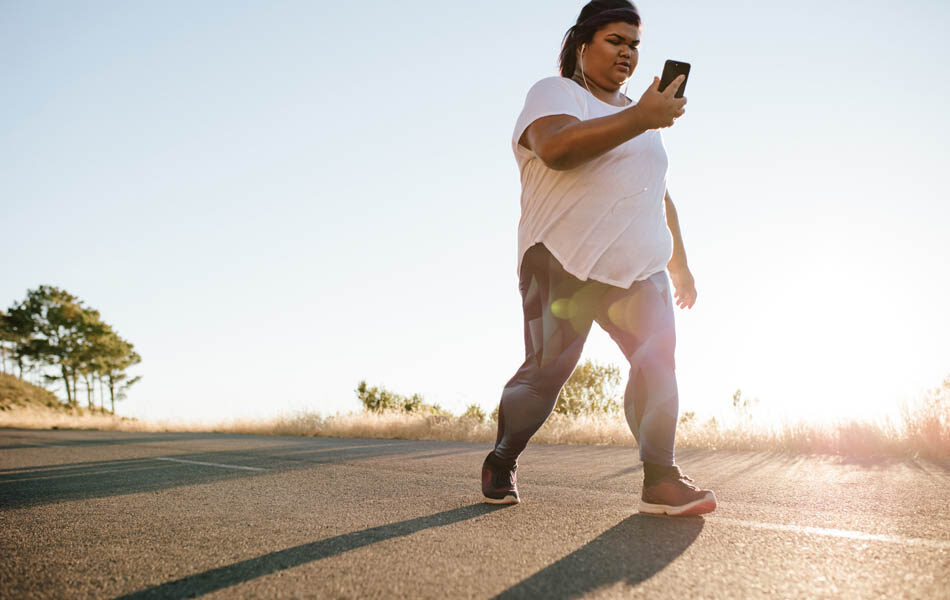What’s the Best Time for Walking to Lose Weight?
Walking is one of the best low-impact exercises out there, but how well does it support weight loss, and is there a special time for it? Today’s article centers on this.

Walking is a great workout for people of all fitness levels, and it has various health benefits. It allows you to cut down on body fat, lose body weight, improve cardiovascular function, and enhance mental health.
However, is there a right or wrong time to go for a walk? Today, we explore different walking options, their respective health benefits, and their effectiveness in losing weight.
What Is the Best Time for Walking to Lose Weight?
Morning is often cited as the best time to walk if you want to lose body weight. That is because walking first thing in the morning helps jumpstart your metabolism. As such, you can burn more calories.
Furthermore, your body is more likely to burn fat for fuel at this time rather than carbohydrates. It also provides an energy boost for the rest of the day.
Lastly, walking in the morning gives you time to clear your head and start your day on a positive note.
However, there is no definitive research on the best time of day to walk for weight loss. Ultimately, it is more important to fit walking into your schedule whenever you can and be consistent with your routine.
Important note: Walking is a great exercise for weight loss because it is low-impact and easy to do, but it is also important to eat a healthy diet and get regular strength-training exercises. If you want to lose weight, aim for a healthy calorie deficit and focus on creating sustainable habits that you can stick with over the long term.
Walking in the Morning
Here are the pros and cons of your morning walking routine.
Advantages of morning walks
Morning walks have several benefits. For starters, a morning walk will help curb your calorie consumption throughout the day, reducing your chances of gaining weight.
On average, walking regularly at a brisk pace burns between 135 and 189 calories, regardless of what time of day you walk. However, a brisk walk in the morning may lead to a higher calorie burn due to the increased metabolism. You can even increase your calorie count by power walking.
Furthermore, research states that regular morning exercises help nurture healthy habits, which is just the thing you need to improve your health.
Walking in the morning can help you wake up and feel more alert for the rest of the day. As such, it improves mental clarity and increases energy levels. Walking also helps reduce stress and promote relaxation.
In addition, moving at a brisk walking pace helps raise your heart rate and get your blood flowing. This helps lower blood pressure, improve heart health, and reduce the risk of heart disease.
Likewise, early morning exercisers are less exposed to air pollution than those who exercise at other hours of the day. Thus, they bask in the positive benefits of exercising in a green space.
Disadvantages of morning walks
Waking up for a morning walk is quite challenging, especially if you are not a morning person. Not only are you still tired, but your body temperature is at its lowest.
This means your body remains frigid, there is less blood flow, and your muscles are cold and stiff. Exercising with cold, stiff muscles increases your injury risk. To avoid injuries, you must warm up before going for your walk.
Additionally, weather can be a factor – if it is too cold or wet outside, you may not want to walk as you could risk getting frostbite or hypothermia.
Nevertheless, you can improve your workouts by incorporating the Walking.Diet fitness program into your routine. Walking.Diet is designed by experts to improve overall health and help you lower the number on the scale.
It offers personalized walking exercises, meal preparation, timeless educational tidbits, and private consultation services.
Coupled with your pre-existing routine, you have all the tools at your disposal to see you through your journey. Overall, including it in your routine is a great idea.

- Offers walking training plan
- Provides warm-up and cool-down workouts before and after walking workout
- Includes keto desserts cookbook
- Offers the articles about food and nutrition, walking gear
Why is it hard to walk in the morning?
The reason why going on morning walks is hard is because your body has not warmed up enough, and you feel less energetic. As a result, your muscles are cold and stiff, making moving taxing.
Walking at Noon
Here are some pros and cons of walking at noon.
Advantages of walking at noon
If your job requires you to sit behind a desk for long hours, then a midday walk is best for you. According to the CDC, over 60% of adults in the US fail to meet the recommended amount of physical activity. As such, midday pulls you from your sedentary job.
Furthermore, this routine helps improve brain function as it helps deliver more oxygen-rich blood to your brain. That way, you return to your job feeling sharper and more aware.
It also allows you to socialize with people while getting much-needed exercise. You can take a short walk or log your daily step count while discussing your next project with your colleagues, walking partners, etc.
Disadvantages of walking at noon
While taking a much-needed break from work should be the norm, midday walks tend to be somewhat impractical, except you have all the time on your hands.
To begin with, many people tend to have inconsistent lunch breaks, so the timing is not always right, especially if you wish to dedicate at least 30 minutes of your time to walking. Likewise, parents, caregivers, and other stay-at-home workers tend to be most busy during this time.
Next, switching from work clothes to workout ones and back to work clothes is quite impractical for many people. For what it’s worth, a mid-day walk will leave you sweaty, and you may need to shower before returning to work.
Lastly, studies prove that people with COPD tend to have reduced lung function past noon. As such, their workouts tend to be 15–20% more challenging compared to healthy people.
Walking in the Afternoon
Here are some pros and cons of walking in the afternoon.
Advantages of walking in the afternoon
To begin with, research points to late afternoon walks as the best time to walk for performance and muscle building. Likewise, experts believe the afternoon to have the lowest perceived exertions, meaning you will be able to work out harder without feeling too much of it.
Furthermore, studies prove that walking in the afternoon helps keep your appetite in check. However, no evidence supports it in reducing your daily energy intake. Still, a reduction in appetite may help sustain your calorie deficit.
Disadvantages of walking in the afternoon
The major drawback of afternoon walks for some people is the lack of energy. After completing your daily tasks, you may be too exhausted to go for a walk. Likewise, gyms tend to have an influx of exercisers at this time, so there might be no free treadmill to use.
Then again, you may have a sudden rush of other responsibilities to tackle, cutting off all rooms to exercise.
Walking in the Evening
Here are some pros and cons of walking in the evening
Advantages of walking in the evening
One great thing about going on an evening walk is that it helps curb snacking, reducing your total calorie intake. Also, a post-dinner walk helps improve food digestion. It is also an effective way to control blood sugar levels.
In addition, evening walks help relieve stress and tension while tiring you out enough to improve sleep quality.
Disadvantages of walking in the evening
Low visibility makes evening exercise dangerous. However, if you must go on an evening walk, you should invest in reflective gear.
Also, a full day’s worth of chores, errands, events, and responsibilities will leave you drained. As such, exercising may be the last thing on your mind.
A Word From a Coach
The best way to benefit from exercising is to do it. Likewise, regarding weight loss walking, you should always remember that exercising alone will not cut it. You need to restructure your entire lifestyle to lose weight and remain healthy.
This includes proper sleep cycles, eating a healthy diet, and taking care of your body.
If you have any doubts about your workout routine, you should consult a personal trainer. They have all the knowledge and tools to help you achieve your fitness goal.
Conclusion
Walking is a good exercise for anybody, irrespective of age and fitness level. Concerning what time of day is best to walk, we have given you the pros and cons, so the choice is yours to make.
Overall, you must be consistent with your exercise to see results. Eat right, train hard, and you will lose weight.

















































 Select your language:
Select your language: 








